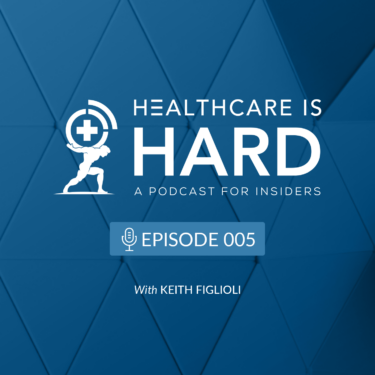Mark Keroack, MD, MPH, has been in and around the healthcare industry for most of his life – long before he became President and CEO of Baystate Health, a not-for-profit, integrated healthcare system that serves over 800,000 people in western New England.
Most people don’t know that medicine has always been a family business for Dr. Keroack – his mother was a nurse, his father was an “old-fashioned” doctor with an office right in their home, all five Keroack brothers ended up becoming doctors, and he even met his wife in medical school.
With this lifelong immersion in healthcare as a foundation, Dr. Keroack has been on the front lines of innovation and digital transformation in the industry. One example is TechSpring, The Baystate Health Technology Innovation Center, which launched under his leadership at BayState in 2014 to bridge the gap between technology innovators and healthcare professionals. As Dr. Keroack describes it, TechSpring lets entrepreneurs get behind the firewall to work with real clinical and claims data, and gives them an opportunity to work collaboratively with physicians to identify and target specific problem areas. Baystate Health is already using a number of innovations that hatched through TechSpring and a few have also gone commercial.
In this episode of Healthcare is Hard: A Podcast for Insiders, Keith Figlioli talks to Dr. Keroack about the major shifts occurring in healthcare and how health systems can and are using innovation to adapt. Dr. Keroack offers his insider perspective on a wide range of topics, including:
- The Importance of “Disciplined Innovation” – there are a lot of ideas being explored to improve healthcare, but where most systems fall down, according to Dr. Keroack, is in their failure to focus and capitalize on the ones that are proven to work. To him, disciplined innovation means going “all in” on the proven ideas and scaling them quickly. Focusing intently on the ideas that work can also help ensure a balanced approach to managing the dichotomy between people in a healthcare organization struggling with change and those who want to adopt new processes and technology as fast as they can. One example Dr. Keroack cites is BayState’s partnership with DispatchHealth, a startup that provides an on-demand, mobile emergency room. DispatchHealth has already made 700 visits around Springfield, Massachusetts and 80 percent of them helped divert patients from making ER visits. With a net promoter score of 95 – a higher NPS than even Apple, Dr. Keroack points out – BayState is working to scale its use of DispatchHealth quickly.
- The Double-Edged Sword of Integrated Delivery – Private practices are becoming more and more rare, and other than boutique primary care practices in wealthy areas or more niche specialties such as ophthalmology or urology that have a better chance of surviving on their own, that trend will continue according to Dr. Keroack. Some things can get lost in this new reality, such as the entrepreneurial spirit and the intimate, personal touch you get from a small office. But there are also many positive gains. Obsessing about how to design systems of care across specialties and across regions often yields better outcomes, or at least less variable outcomes. To Dr. Keroack, this is one of the great motivations of building an integrated delivery network.
- Narrowing the Gap to Consumer-Friendly, Tech-Enabled Healthcare. Productive paranoia is a good thing, and amidst new market entrants like Optum, CVS/Aetna, Walmart, Humana and others, Dr. Keroack says he wouldn’t be doing his job without it. These companies have tremendous resources and sophisticated consumer instincts and technology that they’re using to target – and become the front door to healthcare for – a narrow niche of the continuum that traditional systems manage. If they’re successful, it could leave traditional systems caring mostly for less remunerative, more complex patients. Dr. Keroack talks about the strategy for narrowing the gap between care delivery today and the new, more consumer friendly and tech-enabled interface.
To hear Dr. Keroack talk about these topics and more, listen to this episode of Healthcare is Hard: A Podcast for Insiders.
